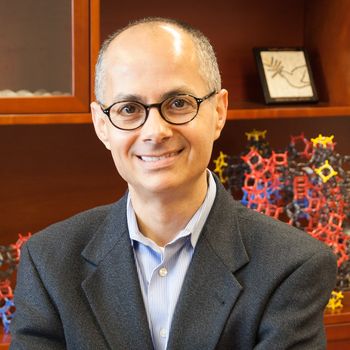Omar M. Yaghi is the James and Neeltje Tretter Chair Professor of Chemistry at University of California, Berkeley. He is widely known for his pioneering work of several extensive classes of new materials: Metal-Organic Frameworks (MOFs), Covalent Organic Frameworks (COFs), and Zeolitic Imidazolate Frameworks (ZIFs). Yaghi established the chemical foundation of the MOF field through his successful crystallization of the first of MOFs with the strong bond approach in 1995, where metal ions are joined by charged organic linkers exemplified by carboxylates, followed by the use of multi-metallic clusters as secondary building units (SBU), the proof of permanent porosity in MOFs by gas adsorption isotherm in 1998, and achieving ultrahigh porosity in 1999 with MOF-5. His discoveries of the first 2D COFs in 2005 and 3D COFs in 2007 vastly expand the scope of organic materials beyond 0D (molecular solids) and 1D (polymers) to 2D (layered COFs) and 3D (network COFs). He termed this field 'Reticular Chemistry' and defines it as the ‘linking of molecular building blocks by strong bonds into crystalline extended structures’. Yaghi has also been leading the effort in applying these materials in clean energy technologies including hydrogen and methane storage, carbon dioxide capture and storage, as well as harvesting water from desert air.
Yaghi is an elected member of the National Academy of Sciences of the United States, and has been honored with many awards for his scientific accomplishments, including the Materials Research Society Medal (2007), the American Chemical Society Award in the Chemistry of Materials (2009), the King Faisal International Prize in Science (2015), the Royal Society of Chemistry Spiers Memorial Award (2017), the Albert Einstein World Award of Science (2017), the BBVA Foundation Frontiers of Knowledge Award in Basic Sciences (2017), the Wolf Prize in Chemistry (2018), the ENI Award for Excellence in Energy (2018), the Gregori Aminoff Prize by the Royal Swedish Academy of Sciences (2019), the August-Wilhelm-von-Hofmann-Denkmünze of the German Chemical Society (2020), and the Royal Society of Chemistry Sustainable Water Award (2020).

